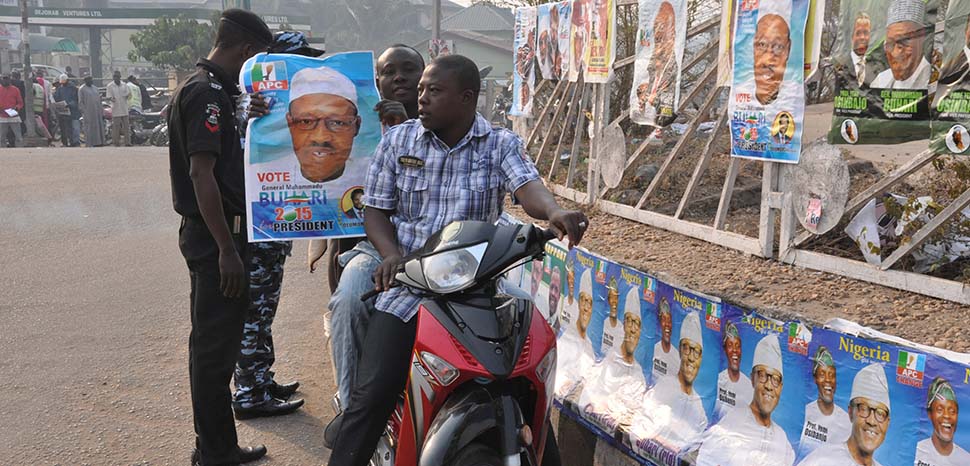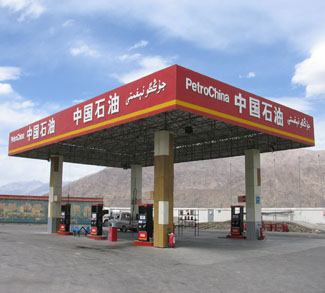Migration has existed from the beginning of time. People have constantly relocated in a quest to secure better living conditions for themselves, their families, and relations. According to the latest United Nations data, the current population of Nigeria is approximately 219 million. The country has a youthful population, as about 70% of its people are aged 30 years or below. Although Nigeria is blessed with abundant natural resources such as natural gas, petroleum, coal, tin, iron ore, limestone, lead, niobium, zinc, and arable land, the government faces various critical situations that are fueling mass migration from Nigeria to the UK, US, Canada, and other developed countries in the past few years. Poor security and economic challenges are just two of the significant issues that Nigerians face.
Nigerians expect a turnaround in governance as they prepare to cast their votes for their preferred presidential candidate. The Independent National Electoral Commission (INEC) claimed that 12,298,944 applicants had completed their voter registration as of 7 am on August 1, 2022. Therefore, it’s up to the voters to choose wisely and fix the country’s poor security and economic situation.
Worsening security outlook in Nigeria
Recent events in the country include Boko Haram activities, banditry, kidnapping, and conflicts between Fulani herders and farmers. Consequently, Nigerian leaders are now regarding national security as a serious issue, and have increased security budgets as a result. The federal government established the Anti-Terrorism Act of 2011 to reduce the incidence of crime. Other measures include increasing homeland security to prevent or disrupt potential attacks; strengthening security agencies by providing security facilities, social services; and disseminating security bulletins. However, notwithstanding these changes, the country still suffers from high levels of insecurity, and is ranked 143 in the Global Peace Index (GPI, 2022), reflecting a deteriorating security situation over the past few years.
Time and time again, Nigeria’s insecurity is either directly or indirectly due to government failure. This is shown by the government’s inability to cater to the public’s basic needs and deliver public services. As Nigerians are not having their basic needs fulfilled, they have become resentful and easily provoked toward violence by otherwise minor incidents. The oft-repeated claim is that, while the nation has more than enough resources to meet the people’s basic needs, corruption at all levels of government has prevented officials from delivering.
Poor security and the 2023 elections
Political unrest remains a significant threat to the 2023 elections in Nigeria. According to National Security Adviser Babagana Monguno, 52 instances of inter or intra-party violence were reported in Nigeria between October 8 and November 9, 2022, across 22 states. The Nigerian Elections Violence Tracker has recorded 130 violent incidents since the beginning of the year, with at least 200 fatalities related to politics. The escalation of political unrest has coincided with the election season. Furthermore, Atiku Abubakar (Hausa/Fulani), Bola Tinubu (Yoruba), and Peter Obi (Igbo) represent Nigeria’s three major ethnic groups as front-runners for the presidency. The ethnic divisions will likely be exploited by ardent political supporters who will disseminate disinformation to escalate tensions.
The Islamist militant organizations Boko Haram, Ansaru, and ISWAP have created enclaves in Zamfara, Katsina, Kaduna, and Niger states. They have consistently maintained their opposition to democracy. The Ansaru, which has ties to Al-Qaeda, has already caused political campaigns in Kaduna state’s Birni Gwari local government area to be shuttered. Additionally, there are over a hundred gangs of bandits operating in the northwest, kidnapping, robbing, and destroying property as part of their perceived ideological battle with the Nigerian government. The likelihood of Islamists and bandits cooperating to sabotage the polls is still very strong because they have previously cooperated when there’s a benefit for both sides.
Another barrier to the 2023 elections is the ongoing call for Biafra to be recognized as a separate entity in the southeast. The separatists, led by the Indigenous People of Biafra (IPOB) region, which has split into at least three other factions, have previously called for boycotts on election day. In light of the ongoing detention of Nnamdi Kanu, the head of IPOB, they are likely to opt for a boycott once more. Recent attacks against the Independent National Electoral Commission’s (INEC) personnel and infrastructure have also allegedly been carried out by the group’s armed wing. For example, an electoral official was killed in Imo state while registering voters.
To organize an election in a nation of 219 million, INEC may require over 1.4 million ad-hoc officials. It could be challenging to find the right workforce under threat of violence. In addition, the ongoing assaults on INEC’s infrastructure – at least six of which have occurred since the beginning of November 2022 – will hinder the organization’s ability to plan appropriately and stay within budget as it works to replace damaged equipment. Poor security will also affect INEC’s capacity to reach over 176,000 polling locations, deploy to all registration areas nationwide, and provide voting materials.
Voter turnout could end up much lower than the 34.75% recorded in 2019 due to fear of violence. This would inevitably raise more questions surrounding the sustainability of Nigeria’s democracy. Even worse, INEC may not declare a winner in national or subnational polls because of constitutional requirements that a winner receive 25% of the vote in two-thirds of the states for presidential elections or districts for gubernatorial elections.
In addition, there are about 3 million Internally Displaced People (IDPs) living in over 20 Nigerian states. Given that voting is location-dependent, it is possible that many IDPs won’t be able to cast their votes. Under the framework and regulations of INEC, IDP elections were held in the northeast and north-central in 2015 and 2019. However, the governors of the northwest, southeast, and other flood-affected regions have refused to declare an IDP program for people affected or even to allow the formation of formal camps thus far.
Nigeria’s economic outlook
The recent outflux of Nigerians leaving the country is the most significant migration the nation has seen since the end of the civil war over 50 years ago. The characteristics of those who are moving is essential: they are young people with skills, such as medical doctors, nurses, IT engineers, university lecturers, and technicians. They also include people who studied abroad but ultimately left their home country due to lack of employment, career opportunities, or basic safety. Some hold degrees from top universities, both domestically and overseas.
The UK Home Office issued a report in June 2022 revealing that up to 15,772 Nigerian visas were granted – a massive 303% increase compared to the 3,918 worker visas granted in 2019. According to the report, the only country ahead of Nigeria was India in the number of visas granted under the ‘Skilled Worker–Health & Care’ category. Nigeria had 14% (13,609) of the total. Recent official data from Canadian immigration sources show that 12,595 Nigerians moved to Canada alone in 2019. There were 4,000 applications for permanent residency by Nigerians in Canada in 2015. By 2019, the number had climbed to 15,595, showing an increase of over 214.9%.
Rising hardship, inequality, and inadequacy of employment opportunities, particularly among the youth, have also affected the Nigerian economic outlook. Nigeria has about 83 million people, 39% of the population living in extreme poverty (less than £1.6 per day) as of April 2022. This is a significant 18% increase from 70 million people recorded in 2016. Therefore, any opportunity to leave the country to earn in a foreign currency makes sense.
Unemployment increases the likelihood of poverty or contributes to its occurrence. As reflected by Nigeria’s unemployment rate, a rise in unemployment causes more individuals to fall below the poverty line. From 2010-2020, the nation’s unemployment rate increased five-fold, from 6.4% to 33.3%. Youth unemployment and poverty have worsened amid a slowing global economy and devastating inflation. More individuals are now living in poverty as inflation has increased from 7% a decade ago to over 20.52% more recently (August 2022).
General insecurity in the nation has also negatively affected agriculture, which accounts for more employment than any other sector and generates around 25.9% of Nigeria’s GDP (2021 numbers). Moreover, many farmers have been driven away due to insecurity, and some are compelled to pay terrorist organizations in order to grow and harvest on their own land. This results in poor agricultural output, hunger, and rising food costs. Consequently, it also hinders the nation’s ability to produce enough food, increasing imports and straining foreign reserves.
An improved security outlook could help bolster investor confidence and improve foreign direct investment (FDI) inflows. Such inflows stood at just $699 million in 2021, their lowest level since 2013. It is impossible to emphasize how unstable the nation is and how it affects day-to-day commerce. Production, marketing, and distribution are all hampered by increased uncertainty and instability. The security situation in the country has frequently forced the suspension of business operations and expansion plans, which has in turn raised unemployment and poverty levels.
Reduced purchasing power, job losses, and lack of access to basic financial services that can lessen disruptions during times of war make lower-income earners more susceptible to these problems. Due to security concerns, many logistics and transportation companies are increasing their rates for some regions. The average air ticket for specific routes has increased by 28.26% over the past year, while the average fare for intercity bus travel has increased by 35.65% over the same t period, according to the NBS. Amid a rising cost-of-living, Nigerians are fleeing the country for safer, relatively more prosperous, socially-inclusive cities.
The link between education and economic growth is well-established. Education is a human capital investment anticipated to produce benefits that will contribute to expanding and enhancing a country’s economy. However, the Nigerian state has not lived up to expectations in the education sector. The latest data from the United Nations Educational, Scientific and Cultural Organization, UNESCO, states that currently, there are 20 million out-of-school children in Nigeria. Despite the Federal Ministry of Education finding flaws in the 2021 figures of an analytical statistics organization, the SBMorgan Intelligence put the number at 12.3 million.
According to recent official immigration data, the number of dependents of Nigerian students in the United Kingdom increased by 3,156.5% to 51,648 in September 2022 from 1,586 in 2019. This implies that, looking at all sponsored study-related visa holders in Nigeria (including main applicants and their dependents), the percentage of dependent visa holders increased significantly from 19% in 2019 to 50% in September 2022. However, the lucky ones who have gotten their degrees are either underemployed or have no job opportunities. In its most recent report on unemployment, Nigeria’s statistics bureau, NBS, stated that over half of the country’s 76,562 doctorate holders in the labor force were either unemployed or underemployed. As a result, migration has spiked to other countries willing to employ them and give them a favorable environment to live in with their families.
Mass migration and upcoming elections
Nigeria’s general election looms in 2023, where the nation will elect a new president because of the term limit on current President Mohammadu Buhari. That incoming president will face a grueling range of difficulties from the first day, ranging from several complicated security crises to a gravely mismanaged economy. Almost 89% of Nigerians responded in a recent Afrobarometer survey that they believed their nation was going in the wrong direction, and 77% said they were unhappy with how their democracy has been functioning.
However, there are several grounds for confidence that the 2023 elections will include better polling than the 2019 presidential race. First, President Buhari has clarified that he wants his legacy to include having a credible, transparent electoral process. New technology has been used to enhance voter accreditation and the transmission of results, while legal reforms allow for earlier planning. An increase in new voter registrations, particularly among young people, is resounding, with at least 8.7 million of the overall 12.2 million new voters falling into the youthful age range of 18 to 34. This suggests that Nigerians think the 2023 elections will be worthwhile investing their time and effort in.
Furthermore, transparent, democratic administration does not come from elections alone. All citizens obey the law, and this is vital. However, new regulations concerning openness and campaign finance are currently moot due to impunity. The killings at the 2020 Lekki toll gate go unpunished. Also, for years, impunity has allowed for the theft of resources that could have otherwise been utilized to help the Nigerian people. Regardless of how smoothly the election goes, any newly elected government will have to deal with this enormous obstacle to establishing the kind of democratic republic that Nigerians hope for.
As the next election is almost here, there are signs of hope for Nigerians suffering from poor security and economic situations. It is the right time for the people to choose a candidate they truly believe in to carry out governance reforms. Also, if there is a more positive environment for citizens, the rate of Nigerians leaving the country as asylum seekers could drop drastically. Because as it is currently, the Nigerian leaders don’t seem concerned about the exodus of youths and professionals. This is because, between 2020 and 2021, the Nigerian Immigration Service issued 38% more passports. And the number of passports issued rose from 767,164 to 1,059,607 in 2020 and 2021, respectively. This suggests that more people are preparing to leave the country. The government isn’t doing anything to stop this tide in terms of policies or actions; it has not implemented any immigration reforms to curb the number of people leaving the nation yearly, either. For only when the root causes of the mass exodus are solved might we see a turnaround in Nigerians leaving for greener pastures in the developed world.
The views expressed in this article belong to the authors alone and do not necessarily reflect those of Geopoliticalmonitor.com.




